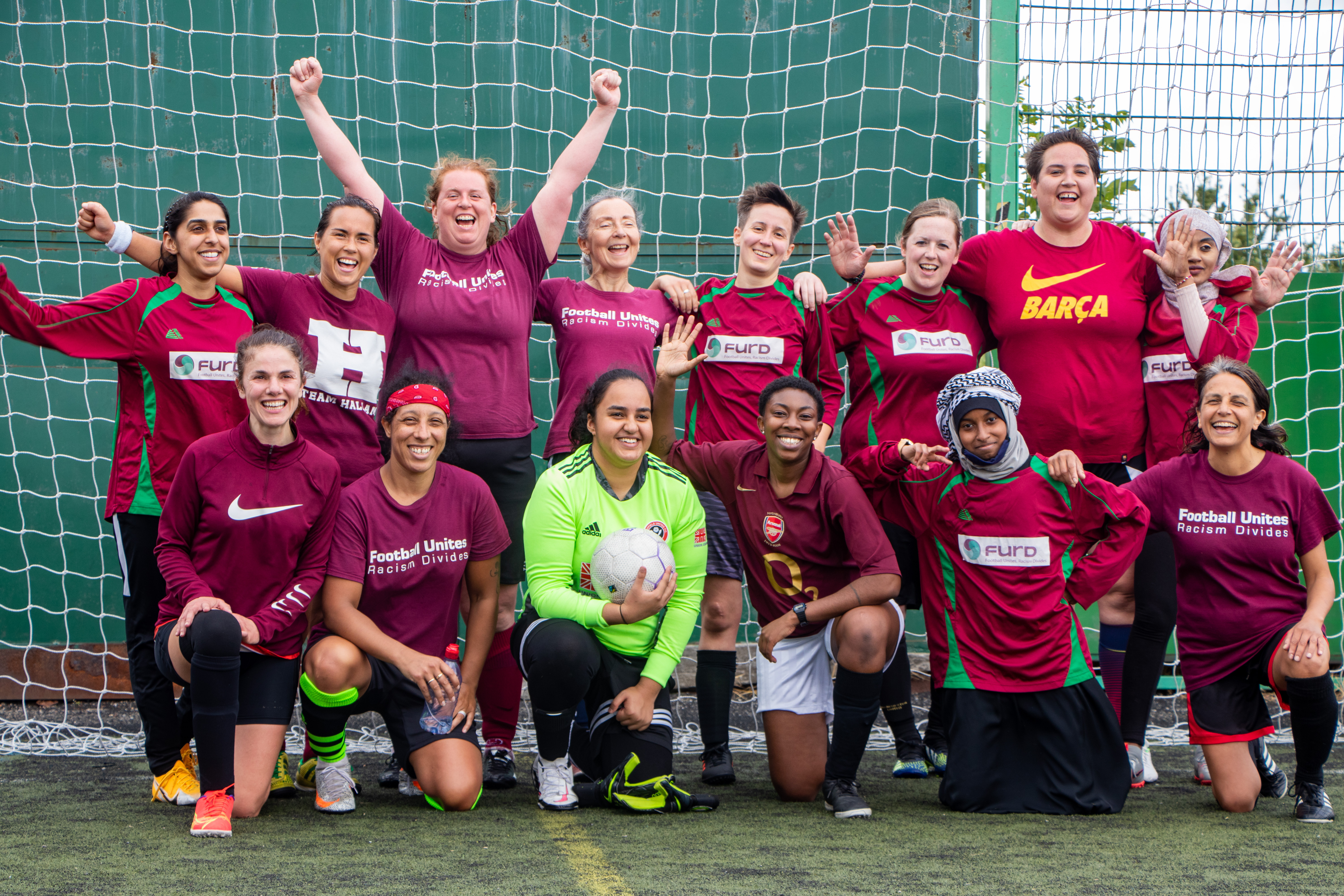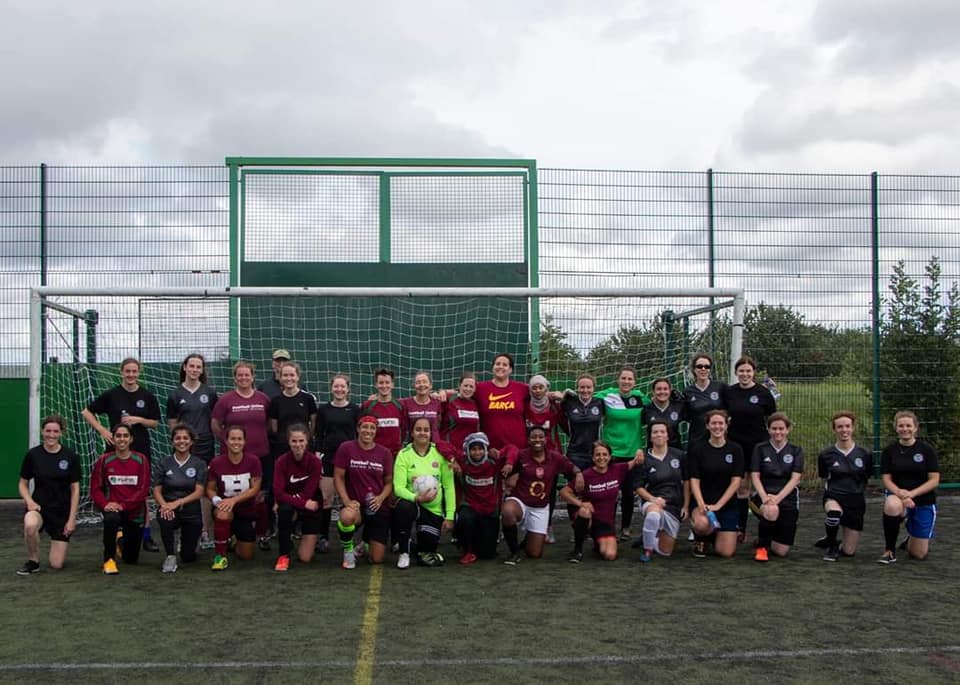
FFF and FURD players between them took along enough foodbank donations to fill two large trollies, and these are being donated to Nether Edge and Sharrow foodbanks.
The following piece was written by FURD volunteer Sarah Choonara:
It may be hard to see how the simple joy of an 11 a side game of football on a Sunday afternoon has close parallels with a distinct feature of our social history. But on Sunday 8 August at Concord Sports Centre in Sheffield two local grassroots organisations - Football Unites Racism Divides (FURD) and Football For Foodbanks (FFF) - came together and echoed the activities of sisters from 100 years ago.

There is more being uncovered every day about this period. Ruth Johnson works as a Resources & Information Worker and Women & Girls' Football Development Worker at FURD, said: “A lot of people think that women only started playing football in the last few years so a group of us have come together to form a project group called ‘Stoppage Time’”.
The project focusses on researching the history and more contemporary accounts of women playing football in and around Sheffield. Ruth has found much evidence of local women's football and associated fundraising during and just after the first world war.

A South Yorkshire Ladies League included teams such as the National Projectile Factory, Vickers and Cooke’s from Sheffield, National Shell Factory and Empire Mills from Barnsley, and Doncaster Wire Works. In December 1916 a crowd of 10,000 watched a match between munitions workers from Vickers Works Projectile Shops in Sheffield at Vickers sports ground, raising £100 for the Wounded Colliers Fund. In April 1917 a team representing a local munitions works’ beat a Vickers’ Works team 5-0 at Oakwell, Barnsley. This charity match attracted a crowd of over 4,000 and a month later an estimated 17,000 watched a charity match involving Sheffield and Barnsley ladies at Hillsborough.
The famous Dick, Kerr Ladies factory team visited South Yorkshire in 1921. Playing at Rotherham in front of 20,000 spectators, they beat Lister’s Ladies of Bradford 7-0, raising £800 for unemployed ex-servicemen. They went on to beat Atalanta Ladies from Huddersfield 4-0 at Hillsborough, Sheffield, in front of around 22,000 spectators, raising about £1,000 for Sheffield and Preston hospitals and the Railway Benevolent Fund.
Soup Kitchen Soccer, a webpage by Patrick Brennan researching the way women’s football supported mining families during the 1921 and 1926 coal disputes in the North East of England also uncovered evidence of the same in Yorkshire. In 1921 several charity matches took place in the South Yorkshire coalfields to raise money for striking miners. Teams included Thurnscoe, Bentley, Doncaster, Goldthorpe, Woodlands, Highfields, Adwick and Carcroft. The Bentley Ladies' team raised funds for local soup kitchens and their contemporaries in the other villages would have done similar.
Of course, women should always have been at liberty to play football for the joy of playing football or for any other reason they chose. But it is not hard to imagine that this rich tradition of raising funds also helped to build and sustain women's football at a time when women, and working class women in particular, had even less agency and autonomy than they do today.
But this was of course not sufficient to see women's football surviving the narrow minded patriarchy in the FA and in wider society. In fact, it was turned against the women themselves when unfounded accusations of donation money being used as players’ expenses formed part of the FA’s ‘evidence’ that a ban on women's football was in order. The threat to the establishment of women having choices, and a political power as they supported workers in dispute, was too much for the FA and their outrageous ban was imposed.
Bentley Ladies were scheduled to play another ‘Soup Kitchen’ match against Hey's Brewery Ladies of Bradford on Boxing Day 1921. But the FA’s ban on 5th December put a stop to this. The growth in women's football and the associated causes it supported had been dealt a violent blow.
Women continued to show resilience and resourcefulness and kept playing whenever and wherever they could in the 50 years under this ban, but so much lost time, resource and momentum has been a big wound to heal.
100 years on after the ban was imposed, it is heartening to see Sheffield's dynamic grassroots football scene.
Alice Rhind-Tutt of the Football For Foodbanks Women and Gender Minorities (WGM) Division says “We were started by a group of players who had been denied football opportunities elsewhere, so decided to make their own. It’s wonderful to find similar schemes around Sheffield with the same ethos and attitude.”
Football For Foodbanks has quickly become a great role model for using football as a charitable tool to help people in food and period poverty. The women of FURD represent a local body who have used football to raise awareness and campaign against racism since 1995. They came together to play a friendly match - FURD women’s first ever 11 a side contest - with participants and spectators bringing foodbank items for collection.
Harper Shillam, another FFF WGM division player says “Amongst all the talk of the vast sums of money in the men’s sport today, it was so refreshing to return to our roots. The match itself was a well-fought game against a skillful and well-organised opponent; and to be able to both come together to help fund something as important and crucial as helping those most in need put food on the table is so wonderful.”
Alice adds that it was “a fun, friendly and inclusive match that supports local communities to boot! We’re really grateful to all the FURD players for welcoming us and being so generous with their donations of food and essentials.”
“Thank you to FURD for an amazing match and to everyone who helped organise the fixture.” says Harper “Thank you also to everyone who came and cheered us both on. Let’s do it again sometime!”
It was indeed a joyous and collaborative occasion and a great echo of, and tribute to, our sisters who did similar 100 years ago and all those who were prevented from doing so.
For more information and to get involved please contact FURD here
https://furd.org/contact
or Football For Foodbanks here
https://footballforfoodbanks.com/
Read more about our Stoppage Time project here:
https://furd.org/stoppage-time